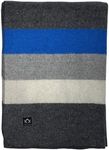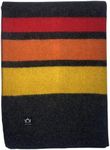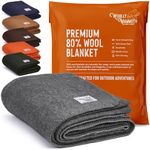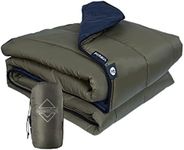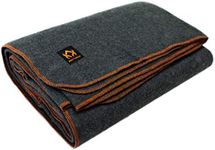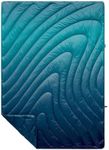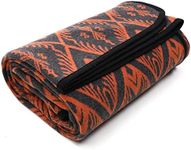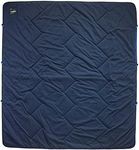Buying Guide for the Best Camping Blankets
Choosing the right camping blanket can make your outdoor experience much more comfortable and enjoyable. A good camping blanket keeps you warm, dry, and cozy, whether you’re sitting around the campfire, sleeping under the stars, or just relaxing at your campsite. When picking a camping blanket, it’s important to think about where and how you’ll use it, the weather conditions you expect, and how much you want to carry. Understanding the key features will help you find a blanket that fits your needs and makes your camping trip better.MaterialThe material of a camping blanket affects its warmth, weight, durability, and how easy it is to clean. Common materials include fleece, wool, synthetic fibers, and down. Fleece is soft, lightweight, and dries quickly, making it good for mild weather. Wool is naturally warm and can insulate even when wet, but it’s heavier and can be scratchy. Synthetic fibers like polyester are often water-resistant and easy to care for, while down is very warm and packs small but loses insulation when wet. Think about the climate you’ll be camping in and whether you need something lightweight or extra warm to help you choose the right material.
SizeThe size of a camping blanket determines how much coverage you get and how easy it is to pack. Blankets come in sizes ranging from small lap blankets to large ones that can cover two people. A smaller blanket is easier to carry and pack, making it good for solo campers or for use as a personal wrap. Larger blankets are better for sharing or for spreading out on the ground, but they take up more space in your bag. Consider whether you’ll use the blanket alone or with others, and how much room you have in your backpack.
WeightWeight is important if you plan to carry your blanket on hikes or backpacking trips. Lightweight blankets are easier to pack and carry, but may not be as warm. Heavier blankets provide more warmth and comfort, but can be bulky and harder to transport. If you’re car camping, weight may not matter as much, but for backpacking, a lighter blanket is usually better. Think about how far you’ll be carrying your blanket and how much warmth you need to decide what weight is best for you.
Warmth/InsulationWarmth or insulation is how well the blanket keeps you warm in different temperatures. Some blankets are designed for cool summer nights, while others are made for colder weather. The type of insulation (like down or synthetic fill) and the thickness of the blanket affect how warm it is. If you camp in cold places or during the shoulder seasons, look for a blanket with more insulation. For warm-weather camping, a lighter blanket will be enough. Match the blanket’s warmth to the lowest temperatures you expect to encounter.
Water ResistanceWater resistance means how well the blanket can handle moisture, like dew, spills, or light rain. Some camping blankets have a water-resistant or waterproof outer layer, which helps keep you dry if the ground is damp or if there’s a light drizzle. This is especially useful if you plan to use the blanket outside your tent or as a picnic blanket. If you camp in wet areas or want extra protection, look for a blanket with water-resistant features. If you’ll mostly use it inside your tent, this may be less important.
PackabilityPackability refers to how small and easy the blanket is to pack and carry. Some blankets come with stuff sacks or straps to help compress them, making them easier to fit in your backpack. Down and some synthetic blankets pack down very small, while wool and thick fleece are bulkier. If you have limited space or need to carry your blanket long distances, choose one that packs down easily. If space isn’t an issue, you can go for a larger or thicker blanket.
Ease of CleaningEase of cleaning is about how simple it is to wash and dry your blanket after a camping trip. Some materials, like synthetic fibers and fleece, are machine washable and dry quickly. Wool and down may require special care, like hand washing or air drying. If you expect your blanket to get dirty often or want something low-maintenance, look for one that’s easy to clean. If you don’t mind extra care, you can consider blankets with more delicate materials.
